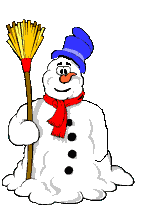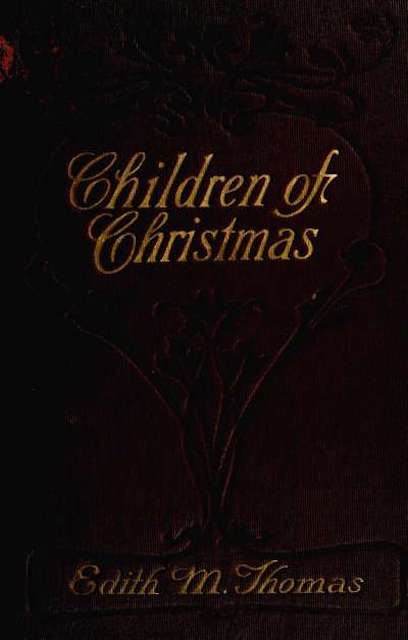
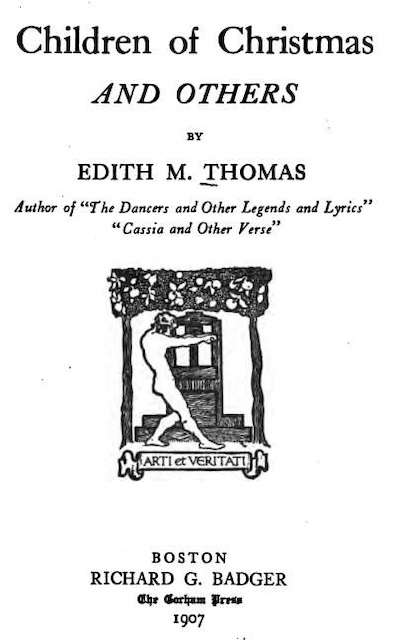
CHILDREN OF CHRISTMAS
AND OTHERS
BY
EDITH M. THOMAS
Author of “The Dancers and Other Legends and Lyrics”
“Cassia and Other Verse”
BOSTON
RICHARD G. BADGER
The Gorham Press
1907
Copyright, 1907, by Edith M. Thomas
All Rights Reserved
The Gorham Press, Boston
CONTENTS
I
CHILDREN OF CHRISTMAS
Cradle Song
How Many
Her Christmas Present
A Christmas Spy
Refreshments for Santa Claus
How the Christmas Tree was brought to Nome
Holly and Mistletoe
The Firebrand
The Foundling
Meeting the King’s
The Procession of the King’s
Melchior’s Ride
One of the Twelve
The Witch’s Child
Babushka
A Christmas Offering
Christmas Post
The Christmas Sheaf
The Birds on the Christmas Sheaf
What the Pine Trees Said
Two Child Angels
The Old Doll
About the Author
Born in Chatham Center, Ohio, Edith Matilda Thomas was educated at the normal school of Geneva, Ohio, and attended Oberlin College (though she had to drop out). She taught school for two years, and then became a typesetter.
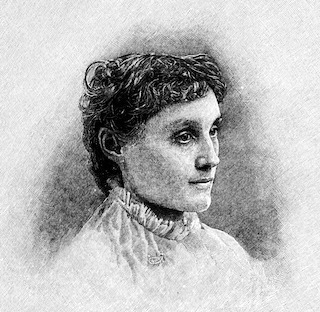
Edith Matilda Thomas, circa 1891
She began writing early for the local newspapers, then was encouraged by author Helen Hunt Jackson to send verse to more important periodicals. She “gained national attention with her poetry…. Scribner’s, The Atlantic Monthly, The Century and other prominent magazines published her poems.” Jackson’s “enthusiastic endorsement produced almost immediate literary celebrity,” according to Ohio History Central.
In 1884, Canadian poet Charles G.D. Roberts wrote of her that “as far as I am aware her poems are not yet gathered in book form, and are therefore only to be obtained, few in number, by gleaning from the magazines and periodicals. Yet so red-blooded are these verses, of thought and of imagination all compact, so richly individual and so liberal in promise, that the name of their author is already become conspicuous…. We are justified in expecting much from her genius.”
Her first volume, A New Year’s Masque and Other Poems, was published in 1885. Two years later she moved to New York City, where she worked for Harper’s and Century Dictionary. She lived in New York for the rest of her life. She published over 300 poems between 1890 and 1909, although “the demands of the leading literary magazines constantly exceeded her supply.”
At her death on September 13, 1925, at age 71 she was cited as “one of the most distinguished American poets” by The New York Times. Her Selected Poems was published in 1926, a year after her death.
Canadian poet Sir Charles G.D. Roberts wrote that “Miss Thomas’s work, in some of its best characteristics, recalls to me Shakespeare’s sonnets.”
In Modern American Poetry, Louis Untermeyer called her “the author of some dozen books of verse, most of them lightly lyrical in mood, although a few of her poems have a more dramatic quality. The best of her work may be found in Lyrics and Sonnets (1887), The Inverted Torch (1890), and The Flower from the Ashes (1915).[5]
The biographical dictionary Notable American Women says that “she drew her principal literary inspiration from the lyrics of John Keats. She was a classic poet in her prosodic regularity and in her continuing attention to Greek subjects. She was romantic in her emphasis on the self, although an aura of sentiment and pathos kept her from developing a constructive romantic position…. She was one of the first poets to capture successfully the excitement (the “ardent bulbs”) of the modern city, and one of the most consistent in crying out against the inroads of the dollar sign on American culture.”
Ed. Note: The full title of this Edith M. Thomas collectiion from 1907 is Children of Christmas and Others. The book has three sections: I. The Children of Christmas, II. Other Children, and III: Some of Their Friends. This reprint, courtesy Project Gutenberg, includes only the first section, The Children of Christmas, as a new addition to the Deep Roots Yuletide Baedeker of 2023. Follow this link to the complete book, available at no cost, on Project Gutenberg.
Source: Wikipedia
I
CHILDREN OF CHRISTMAS
CRADLE SONG
For one Born at Christmas
Happy thou, a winter comer,
Happier with the snows around thee
Than if rosy-fingered summer
In thy cradle-nest had crowned thee.
Tender is the night, and holy:
Little clouds, like cherub faces,
Up the moon path, drifting slowly,
Vanish in the heavenly spaces.
Clothed in splendor, past our earth night,
Sphere on sphere is chanting Nowel:
Child, thy birthnight keeps a Birthnight
Dearest in all Time’s bestowal!
He who slept within a manger
Guards the pillow thou art pressing-
Sent thee hither, little stranger,
Blest-to be our Christmas Blessing!
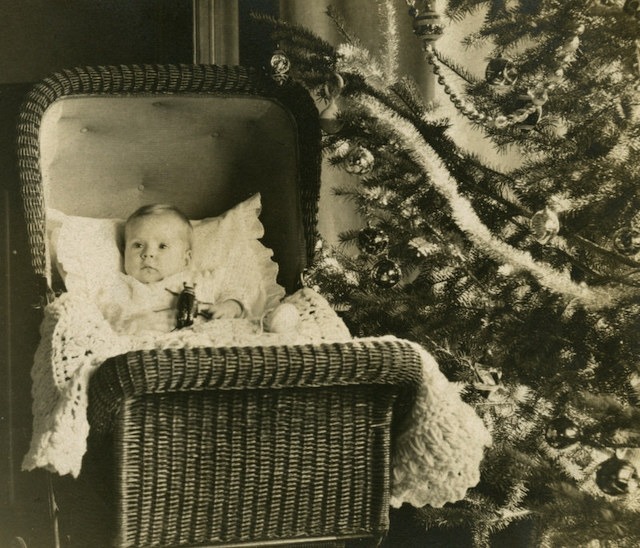
Source: Alan Mays on Flckr
HOW MANY
Resting her curly head on my knee,
And slipping her small hand into mine,
My baby girl asks how many there’ll be
On Christmas day when we dine.
Though I’ve told her before, and she knows very well,
“There’ll be grandpa and grandma,” I repeat,
And Uncle Charlie and Aunt Estelle
And Cousin Marguerite.
And Uncle Philip and Cousin Kate,
And mamma’s old friend, Miss Madeline;
And-let me see-ah, yes, that is eight,
And Mr. Brownell makes nine!
As I close my story I hear a sigh,
The curly head closer nestles, and then,
In a sad little voice, “How many are I?”
“My darling! At least you are ten!”
HER CHRISTMAS PRESENT
A True Incident
With doll in arms to court she came,-
A mite of tender years
Between her sobs she put the case,
Her eyes brimmed up with tears.
“They’ve put my mamma into jail-
And oh, I love her so!
She’s very good-my mamma is-
Please, won’t you let her go?”
“Just look! She made this doll for me”
(She held it up to view).
The judge did look. “Don’t cry,” he said,
“We’ll see what we can do.”
“What charge against the prisoner, clerk?”
“Sold apples in the street.
She had no license, and, when fined,
The fine she could not meet.”
“My mamma’s good. Please, let her go.”
The judge looked down and smiled;
“So well you’ve pleaded, she shall be
Your Christmas Present, child.”
“Now take this paper, little one,
It sets your mother free.
She should be very proud of you;
Go, tell her so, from me.”
With doll in arms away she went,
And soon the prison gained;
And when her mother clasped her close,
The happy child explained:
“A kind, good man like Santa Claus,
With hair as white as snow,
He let you out because-because
I asked him too, you know!”

‘A kind, good man like Santa Claus/with hair as white as snow/he let you out because—because I asked him too, you know’
A CHRISTMAS SPY
When Phœbe brought the wood and coal;
To lay the fire, what did she see
But Baby-dropped upon one knee
And peering up the chimney-hole!
She never turned her little head,
With all its curly, yellow hair:
I asked, “What are you doing there?”
“Me look for Santa Taus!” she said.
REFRESHMENTS FOR SANTA CLAUS
“It may be late and stormy and cold
When Santa Claus reaches our street;
And Santa, you know, is very old,
So I’ll leave him something to eat.”
“And what do you think he would like, dear heart,”
“Something nice and sweet,” she said;
“Jelly and jam, and a cranberry tart,
And a teenty piece of bread!”
So there on the sideboard is Santa’s feast,
Which her own small hands have spread;
Jelly and jam,–three kinds at least,
And a tart–but where is the bread?”
HOW THE CHRISTMAS TREE WAS BROUGHT TO NOME
Night of the winter-winter and night in the city of Nome,
There where the many are dwelling, but no man yet has a home!
Desolate league upon league, ice-pack and tundra and hill;
And the dark of the year when the gold-hunter’s rocker and dredge are still!
By the fire that is no man’s hearth,-by the fire more precious than gold,
They are passing the time as they may, encompassed by storm and by cold:
And their talk is of pay-streak and bedrock, of claim by seashore or creek,
Of the brigantine fast in the ice-pack this many and many a week;
Wraiths of the mist and the snow encumber her canvas and deck,-
And the Eskimos swear that a crew out of ghostland are crowding the wreck!
Thus, in the indolent dark of the year, in the city of Nome,
They were passing the time as they might, but ever their thoughts turned home.
Said the Man from the East, “In God’s country now (where we’d all like to be),
You may bet your life there’s a big boom on for the Christmas Tree;
And we’d have one here, but there isn’t a shrub as high as my hand,
Nor the smell of spruce, for a hundred miles, in all this land!”
Then the Man from the South arose: “I allow, if the Tree could be found,
I’d ‘tend to the fruit myself, and stand ye a treat all round!”
“Done!” said the Man from the West (the youngest of all was he).
“I’ll lose my claim in the ruby sand–or I’ll find the Tree!”
The restless Aurora is waving her banners wide through the dome,
And the Man from the West is off, while yet they are sleeping in Nome!
Off, ere the low-browed dawn, with Eskimo, sledge, and team:
He is leaving the tundra behind, he is climbing the source of the stream!
On, beyond Sinrock-on, while the miles and the dim hours glide-
On, toward the evergreen belt that darkens the mountain side!
‘Tis a hundred miles or more; but his team is strong, is swift,
And brief are his slumbers at night, in the lee of the feathery drift!
There were watchful eyes, there were anxious hearts in the city of Nome;
And they cheered with a will when the Man from the West with his prize came home!
And they cheered again for the Christmas Tree that was brought from far,
Chained to his sledge, like a king of old to the conqueror’s car!
Said the Man from the South, “I’ll ‘tend to the fruit that grows on the Tree!”
Said the Man from the East, “Leave the Christmas dinner and trimmings to me!”
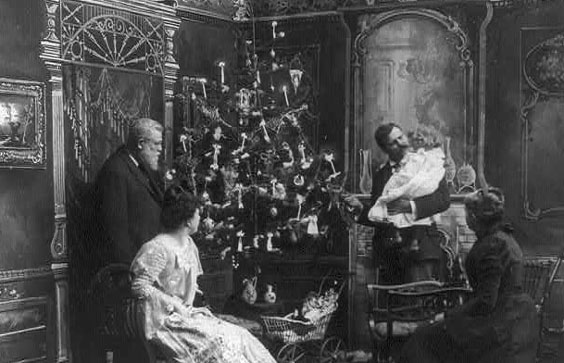
‘…they cheered again for the Christmas Tree that was brought from far…’
HOLLY AND MISTLETOE
Said the Holly to the Mistletoe:
“Of this holy-tide what canst know,
Thou a pagan–thou
Of the leafless bough?
My leaves are green, my scarlet berries shine
At thought of things divine!”
To the Holly spake the Mistletoe:
“Matters not, my leafless boughs but show
Berries pale as pearl–
Ask yon boy and girl!
If human mirth and love be not some sign
Of share in things divine!”
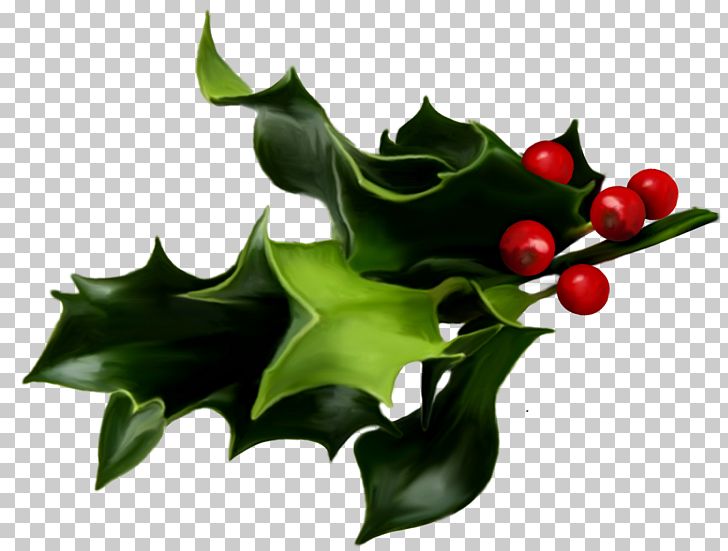
THE FIREBRAND
(Northern Ohio, Christmas Eve, 1804)
Hark to a story of Christmas Eve
In the lonely days of yore:
‘Tis of the measureless, savage woods
By the great lake’s windy shore-
Of mother and child, in a firelit span,
Where the wilderness bows to the toil of man!
“Christmas is coming, and father’ll be here;
Through the woods he is coming, I know!
Over his shoulder his ax is laid,
And his beard is white with snow!
Yes, but look in the fire, my child,
At the strange cities there, so bright and so wild!”
“Mother, what are those restless flames
That close by the window pass?”
“Only the firelight fairies, child,
That dance on the window-glass!
But look, how the sparks up the chimney fly,
Up, and away, to the snowy sky!”
“Oh, listen, what are those shuddering cries,
Mother, what can they be?”
“Only the branches that grate on the roof,
When the wind bends down the tree!
Now sing me the song I’ve taught to you,
That I, myself, as a little child knew!”
“But, mother, those flames dart back and forth-
Like balls of fire they play!
And those shuddering cries are at the door;
‘You must let us in,’ they say!”-
“My child! Your father’s whistle I hear-
Say a prayer for him-he is coming near!”
She has seized the tongs, she has snatched a brand,
And waved it abroad at the door!
Through the drifting snow a form she sees-
He is safe, in a moment more;
Safe–and afar are those shuddering cries,
And the baleful lights of the wolves’ red eyes!
Thus did it chance on a Christmas Eve,
In the days that are long since fled;
But a light so brave, and a gleam so true,
Through the waste of the years is shed,
As I think of that blazing, windblown brand,
Waved at the door by a slim, white hand!
THE FOUNDLING
I
The good man sat before the fire,
And oftentimes he sighed;
The good wife softly wept the while
Her evening work she plied:
One year ago this happy time
The little Marie died!
II
“And surely, now, if she had lived,
She would have reached my knee!”
“And surely, now, if she had lived,
How cunning would she be!”
In fancy each a darling face
Beside their hearth could see.
III
The door swung wide–a gust of wind
The fitful candle blew;
‘Twas Franz, the awkward stable-boy,
His clattering step they knew.
“But Franz, speak up, speak up, and tell
What thing has chanced to you!”
IV
His round blue eyes with wonder shone,
His bashful fears had fled:
“I saw–I saw the cattle kneel
Upon their strawy bed;
And in a manger lay the Child–
A light shone round His head!”
V
“He must have dreamed,” the good man said,
“A vision, it would seem.”
“Nay, master, for the light shone bright
On stall and loft and beam.”
Then said the good wife, “I, perhaps,
Might go and dream this dream!”
VI
No further words, but forth she fared,
With Franz to lead the way.
They reached the barn, whose sagging door
Shot out a yellow ray;
The kine did kneel upon the straw,
As truthful Franz did say!
VII
And there-oh, lovely, lovely sight,
Oh, pleading, tender sight!
Within a manger, lapped in hay,
A smiling, rosy mite
The good wife saw, and nearer held
The lantern’s yellow light.
VIII
She took the foundling in her arms,
And on its sleeping face
Her tears and kisses fell in one:
“How great is Heaven’s grace!
It is the Christ-Child’s gift to me,
To ease the aching place!”
MEETING THE KING’S
(Suggested by “A Provençal Christmas Postscript,” Thomas A. Janvier)
Long, long ago, in dear Provence, we three!
Three children, ruddy with the midi sun
(And blither none the all-seeing sun might see),
How happy when the harvest-time was done,
The last slow drop from out the winepress run;
And when the frost at morn was thick like snow;
And when Clotilde at evening sang and spun,
And old folk, by the new fire’s ruddy glow,
Would tell, as I do now, the tales of long ago!
Those tales-ah, most of all, we begged to hear
The tales our grandsires from their grandsires had-
How, in the darkening undertime of year,
When with first-fallen snow the fields were clad,
That blessèd time when nothing can be sad
(Such peace through Christ’s dear might encircles all),
How, then, the sleeping hives made murmur glad-
The white ox knelt within his littered stall,
And voices strange and sweet were heard through heaven to call!
We were three children-René, Pierre, Annette.
The little sister listened, wonder-eyed;
Each held her hand (that touch, I feel it yet!),
And all three drank those tales of Christmas tide.
The leaden-footed time how shall we bide?
How many days and hours we know full well,
Almost the little minutes that divide!
Meanwhile, like music of a hidden bell,
Our beating hearts keep up the chime, Noël, Noël!
One thing there was, desired above all things:
“Say, will they come (as ever from of old)–
The wise, the good, the three great Eastern King’s,
Who brought rich gifts,-frankincense, myrrh, and gold?”
How often of their names had we been told–
Balthasar, Melchior, Gaspard,–splendid all,
Wide-turbaned, sandal-shod, and purple-stoled,
Perhaps upon white steeds, curbed-in, and tall,
Or else on camels with the velvet-soft footfall!
“Will they at vespers be, on Holy Night?
And will they stop and see the little shrine
Where Jesus lies beneath the Star’s true light,
As when, at first, they found him by that sign?”
“Hush, René, hush! and if the eve be fine,
Thou–yes, all three-shall go to meet the King’s.
But children-mark ye well these words of mine!
Each way, of four, to town the traveler brings;
So it may chance ye miss them in your wanderings.”
Such sage replies our questions would receive.
The Holy Time drew near, and yet more near;
At last, it was the morning of the Eve,
All day we swayed from lovely hope to fear.
“‘Too early?’ Nay, ’tis twilight, mother dear-
At least, so very soon the sun will set!”
“Your warmest coats-the air is sharp and clear.
And in your hurry, children, don’t forget
That baby feet tire soon–remember p’tite Annette!”
“No, no! I do not tire, though fast I run!”
Ah, how we laughed to see the red lips pout-
The small sweet pride that would not be outdone
In such a race, by brothers big and stout!
“Annette the first shall see the King’s, no doubt”-
It was our grandsire spake with twinkling eye.
“Yes, yes; she shall,” impatient to be out,
We answered. Once beneath the deepening sky,
We ever took the sunset way-as late birds thither fly!
For thus we reasoned with one grave consent:
If yonder star above our mountain’s crest
Should be that Eastern star for guidance lent,
Then must the King’s be journeying from the West.
So on we ran, past harvest fields at rest,
Past sheepfolds where the flock of summer dreamed
(Full soon they would be kneeling, as we guessed!)
And on, and on-and now, at times, it seemed
Far down the twilight road rich banners waved and gleamed.
But ever of enchanted weft they proved,
On sunset’s pageant field emblazoned low;
And caravans, still moving as we moved,
At length, for straggling olive trees would show.
Then, while less confident our pace would grow,
Wiser than I-a twelvemonth and a day,
Would René counsel: Might it not be so-
As we had heard our own dear mother say-
The roads are four–the King’s had come another way?
No time to lose. We took the homeward track,
The King’s at vespers might be lingering still.
Soon were we in the church. Alack, alack!
The King’s had passed; for though they bore good will
To our good parish, yet must they fulfil
The prayers of all; and there were other folk
Who, if unvisited, would take it ill.
“‘Tis said they must reach Arle by midnight stroke;
Sweet spices they have left–judge by the censer’s smoke!”
We boys took manfully this frown of Fate;
But tears stood in petite Annette’s blue eyes.
“Another year, my precious, thou canst wait;
Besides, to-morrow morn a fine surprise
There’ll be for children who are sage and wise.
Gifts–but I may not tell you now, my child.”-
‘Twas mother-love that did such cure devise
For bud-nipped hopes and hearts unreconciled;
We slept, and dreamed, on this-and then, the morning smiled!
Time passed. We never saw the King’s. Ah, well–
At least the two of us saw not, I know.
But how shall I the wonder of it tell?
There came a winter wild and dim with snow.
It seemed to us that sheeted ghosts did go
Upon the wind, that never ceased to moan.
And one of us with fever was laid low:
Like leaves the little hands were tossed and thrown,
And on her cheek the rose of fever was o’erblown!
The storm was done. The day threw off its shroud-
(‘Twas Christmas Eve–till then by all forgot),
And suddenly, across a scarp of cloud
One crimson flame, a parting sunbeam shot.
It reached Annette upon the low, white cot,
It touched our mother’s face, Madonna-mild.
With dreaming eyes that saw us, yet saw not,
Petite Annette threw out her hand and smiled:
“Pierre! The King’s have come, and with them is a Child!”
Long, long ago in dear Provence was grief.
In vain the troubadour may sing Noël!
In vain the birds give thanks for Christmas sheaf,
In vain I heard, “God loved Annette so well
That He hath taken her to heaven to dwell.”
No comfort till René would whisper me:
“O brother, think upon it–who can tell?–
Perhaps there was no other way, to see!
And, Pierre, remember how she told the news to thee!”

‘We Three King of Orient Are,’ Choir of King’s College, Cambridge (2009)
THE PROCESSION OF THE KING’S
The little town is muffled all in snow;
Yet there Weihnachten[1] love is burning clear.
And on each door three letters[2] in a row
Proclaim the Three King’s’ Day is drawing near.
Oh, then will Caspar, Melchior, Balthazar
Ride through the country on their horses white!
And all the people, live they far or near,
Will early rise and follow with delight.
And never will the great procession stop
Till they Christkindlein and his mother greet:
Then on their knees the turbaned King’s will drop,
And fill her lap with gifts, and kiss his feet;
For they will find her, sitting still and meek
Upon a bench beside some stable-shed,
Her soft hair brushing dear Christkindlein’s cheek,
And sunshine brightness all around each head!
Then, while the old folk smile through happy tears,
Blame not the children if a shout they raise
When little Esel,[3] with his pointed ears,
Leans o’er the fence with puzzled, wistful gaze.
There, too, the gentle, great black ox will stand:
Folk say he knelt at night in strawy stall;
Perchance he knows these King’s from Eastern land,
For now he lifts his head with lowing call!
[1] Weihnachten-Christmas
[2] In many parts of Southern Germany it is a custom to place on the outer door the initials of the three King’s–C. M. B.
[3] Esel-German for “donkey,”
MELCHIOR’S RIDE
Melchior rides from door to door,
Large Christmas doles he seeks;
A pannier wide receives the store,
Yet never a word he speaks!
The nougat bells so merrily ring
Yet never a note he hears;
He gathers the gifts the good folk bring,
And onward still he steers.
The children laugh, and the children chaff,
He sits so stiff and straight,
And grandpère waves, with his thorn-tree staff,
A greeting at the gate!
Olives and almonds, and cheese and bread,
And the pack on his back grows stout!
Let the hungry poor to their fill be fed,
While the nougat bells ring out.
Thus, Melchior rides from door to door,
Seeking of all his fee;
And their presents into his pannier pour,
Yet never a whit cares he!
For a wicker-work man is Melchior droll,
A wicker-work man, and no more;
But the people love him, with heart and soul,
As he rides from door to door!

‘Hark! The Herald Angels Sing (Descant: David Willcocks), Choir of King’s College, Daniel Hyde (Director), Paul Greally (Organ Scholar), from BBC Carols from King’s 2021
ONE OF THE TWELVE
A CHRISTMAS CAROL
From the Provençal of Roumanille
“Great stir among the shepherd folk;
To Bethlehem they go,
To worship there a God whose head
On straw is laid full low;
Upon the lovely newborn Child
Their gifts will they bestow.
“But I, who am as poor as Job-
A widowed mother I,
Who for my little son’s sweet sake
For alms to all apply-
Ah, what have I that I can take
The Child of Love most high?
“Thy cradle and thy pillow, too,
My little lamb forlorn,
Thou sorely needest them-no, no,
I cannot leave thee shorn!
I cannot take them to the God
That in the straw was born.”
Oh, miracle! The nursing babe-
The babe e’en as he fed-
Smiled in his tender mother’s face,
And, “Go, go quick!” he said;
“To Jesus, to my Saviour, take
My kisses and my bed.”
The mother, all thrilled through and through,
To heaven her hands did raise;
She gave the babe her breast, then took
The cradle–went her ways,…
And now, at Bethlehem arrived,
To Mary Mother says:
“O Mary, Pearl of Paradise,
That heaven on earth hath shed,
O Virgin Mother, hear the word
My little babe hath said:
To Jesus, to my Saviour, take
My kisses and my bed.
“Here, Mary, here the cradle is;
Thy need is more than mine;
Receive, and in it lay thy Son,
Messiah all-divine!
And let me kiss, upon my knees,
That darling Babe of thine!”
The blessed Virgin, then, at once,
Right glad of heart, bent low,
And in the cradle laid her Child,
And kissed him, doing so.
Then with his foot St. Joseph rocked
The cradle to and fro.
“Now, thanks to thee, good woman, thanks,
For this that thou hast done.”
Thus say they both, with friendly looks.
“Of thanks I merit none;
Yet, holy Mother, pity me,
For sake of thy dear Son.”
Since then a happy soul was hers;
God’s blessing on her fell;
One of the Twelve her child became,
That with our Lord did dwell.
Thus was this story told to me,
Which I afar would tell.
BABUSHKA
(A Russian Legend)
Babushka sits before the fire
Upon a winter’s night;
The driving winds heap up the snow,
Her hut is snug and tight;
The howling winds,–they only make
Babushka’s more bright!
She hears a knocking at the door:
So late–who can it be?
She hastes to lift the wooden latch,
No thought of fear has she;
The wind-blown candle in her hand
Shines out on strangers three.
Their beards are white with age, and snow
That in the darkness flies;
Their floating locks are long and white,
But kindly are their eyes
That sparkle underneath their brows,
Like stars in frosty skies.
“Babushka, we have come from far,
We tarry but to say,
A little Prince is born this night,
Who all the world shall sway.
Come, join the search; come, go with us,
Who go our gifts to pay.”
Babushka shivers at the door:
“I would I might behold
The little Prince who shall be King,
But ah! the night is cold,
The wind so fierce, the snow so deep,
And I, good sirs, am old.”
The strangers three, no word they speak,
But fade in snowy space!
Babushka sits before her fire,
And dreams, with wistful face:
“I would that I had questioned them,
So I the way might trace!
“When morning comes with blessèd light,
I’ll early be awake;
My staff in hand I’ll go,-perchance,
Those strangers I’ll o’ertake;
And, for the Child some little toys
I’ll carry, for His sake.”
The morning came, and, staff in hand,
She wandered in the snow.
She asked the way of all she met,
But none the way could show.
“It must be farther yet,” she sighed;
“Then farther will I go.”
And still, ’tis said, on Christmas Eve,
When high the drifts are piled,
With staff, with basket on her arm,
Babushka seeks the Child:
At every door her face is seen,-
Her wistful face and mild!
Her gifts at every door she leaves;
She bends, and murmurs low,
Above each little face half-hid
By pillows white as snow:
“And is He here?” Then, softly sighs,
“Nay, farther must I go!”
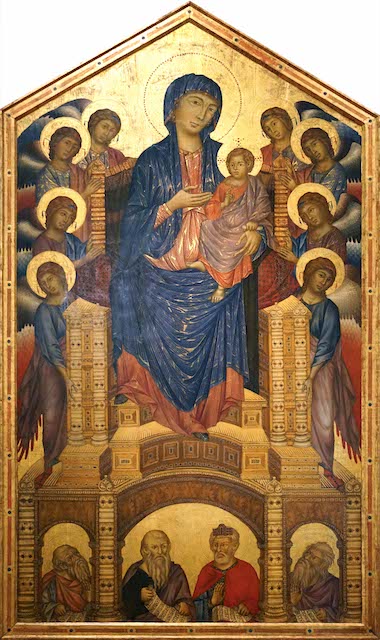
Cimabue’s Santa Trinita Maestà (c. 1290-1300)
A CHRISTMAS OFFERING
(Florence, Italy)
I shall never forget Cimabue’s Madonna,
No, nor the niche close by in the wall,
Where, on the straw, the Bambino was lying,
While the oxen knelt in the stall.
Rude are the images, tinsel the flowers;
But a tear to the eye unconsciously starts,
Beholding the tribute the children have rendered,
In the votive gift of “hearts”!
Among them a little gold watch was hanging,
That told of some sick child’s treasured wealth,
Sent with a prayer that his Christmas present
Might be the good gift of health!
CHRISTMAS POST
In Sulz-am-Neckar, when night shuts down,
And the Christmas Eve has come,
All through the little snow-white town
There’s a joyous stir and hum.
Now here and now there, along the street,
From windows wide open flung,
Float childish laughter and prattle sweet
In the kindly German tongue.
For the happy moment at last is here,
When each child a letter sends,
Directed to Christkindlein dear-
The Children’s Friend of Friends!
Then, out at the window-strung on a thread,
The precious letter is cast;
Though far and high on the night wind sped,
‘Twill be found and read at last!
In Sulz-am-Neckar, prompt as the day,
The children awake to find
Among the Christmas branches gay
Christkindlein’s answer kind!

‘Once in Royal David’s City,’ (Descant by Philips Ledger), Choir of King’s College, Cambridge, BBC Carols from King’s 2019
THE CHRISTMAS SHEAF
(Provençal)
It was a gleaner in the fields,
The fields gleaned long ago:
The evening wind swept down from heights
Already brushed with snow.
The gleaner turned to right, to left,
With searching steps forlorn;
The stubble-blade beneath her feet
Was sharp as any thorn.
But as she stooped, and as she searched,
Half blind with gathering tears,
Beside her in the field stood One
Whose voice beguiled her fears:
“What seek ye here, this bitter eve,
The harvest long gone by?”
She lifted up her weary face,
She answered with a sigh:
“I seek but some few heads of wheat
To nail against the wall,
To feed at morn the blessed birds,
When with loud chirps they call.
“Poor ever have I been, God knows!
Yet ne’er so poor before,
But they might taste their glad Noël
Beside my cottage door.”
Then answer made that Presence sweet,
“Go home, and trust right well
The birds beside your cottage door
Shall find their glad Noël.”
And so it was-from soundest sleep
The gleaner woke at morn,
To see, nailed up beside her door,
A sheaf of golden corn!
And thereupon the birds did feast,-
The birds from far and wide:
All know it was Our Lord Himself
That goodly sheaf supplied!
THE WITCH’S CHILD
‘Tis Elfinell–a witch’s child,
From holy minster banned….
Again the old glad bells ring out
Through all the Christmas land.
No gift might she receive or give,
Nor kneel to Mary’s child:
She watched from far the joyous troop
That past the Crib defiled;
Far in the shadow of the porch,
Yet even there espied:
“Now, hence away, unhallowed Elf!”
The sacristan did chide.
“Hence, till some witness thou canst bring
Of gift received from thee,
In His dear name, whose birth we sing,
But this shall never be!”
Poor Elfinell-she turned away:
“Though none for me may speak,
Yet there be those may take my gift;
And them I go to seek!”
So, flitting light through lonesome fields
By summer long forgot,
She crossed the valley drifted deep-
The brook in icy grot;
And gained, at last, a still, white wood
All hung with flowers of snow:
There, down she sat, and quaintly called
In tender tones and low.
They heard and came-the doe and fawn,
The squirrel and the hare,
And dwellers shy in earthy homes,
And wanderers of the air!
To these she gave fresh leaves of kale.
To those the soft white bread,
Or filberts smooth, or yellow corn;
So each and all she fed.
She fed them from her hand-she sighed;
“Might you but speak for me,
And say, ye took my Christmas gift,
Then, I the Crib might see!”
At this, those glad, wild creatures join,
And close the child around;
They draw her on, she scarce knows how,
Across the snowy ground!
They crowd with soft, warm, furry touch;
They stoop with frolic wing:
Grown strangely bold, to haunts of men
The elfin child they bring!
They reach the town, the minster door;
The door they straightway pass;
And up the aisle and by the priest
That saith the holy mass.
Nor stay, until they reach the Crib
With all its wreathen greens;
And there above, with eyes of love,
The witch-child looks and leans!
Spake, then, the priest to all his flock:
“Forbid no more this child!
To speak for her, God sendeth these,
His loved ones of the wild!
“‘Twas God that made them take her gift,
Our stubborn hearts to shame!
Melt, hearts of ours; and open, hands,
And give in Christ’s dear name.”
Thus, Elfinell with gifts was showered,
Upon a Christmas Day;
The while, beside the altar’s font,
The ban was washed away.
A carven stall the minster shows,
Whereon ye see the priest priest-
The kneeling child-and clustering forms
Of friendly bird and beast.
THE BIRDS ON THE CHRISTMAS SHEAF
“And wherefore,” the finch to the starling said,
On the Christmas sheaf, as they hungrily fed,
“Wherefore do now the children of men
Open their hands, when, again and again,
They drove us away from their plenteous store,
From the corn in the field, from the threshing-floor?”
“That,” said the starling, “I’ll try to explain:
They are feasting, themselves, and they spare us this grain;
For oft, as they feast and make merry, they sing,
‘Peace upon earth and good will’–“
“But this thing”
(Said the finch), “we birds have been singing all year,
Then, why not before have they shared their good cheer?”
WHAT THE PINE TREES SAID
I heard the swaying pine trees speak,
As I went down the glen:
“Next year,” said one, “the wind shall seek,
But find me not again!”
“I shall go forth upon the seas,
A mast, or steering-beam;
On me shall breathe the tropic breeze,
Above, strange stars shall gleam.”
“And I-the ax shall cleave my grain,
And many times divide;
From my dear brood I’ll shed the rain,
And roof their ingleside.”
Then up and spake a slender shaft,
That like an arrow grew;
“No breeze my leafless stem shall waft,
No ax my trunk shall hew-
But though a single hour is mine,
How happy shall I be!
Young hearts shall leap, young eyes shall shine
To greet their Christmas tree!”
TWO CHILD ANGELS
Two Child Angels on Christmas Night,
They stood on the brow of Heaven’s hill;
The stars beneath them were glancing bright,
And the air was clear and still.
“That is the Earth that dazzles so-
That shines with a glad and a radiant light-
That is the Earth where, long ago,
I was born on the Christmas Night!”
Thus said the one, and the other replied,
“Forever dear is the Earth in my sight;
For there, full long ago, I died,
On the holy Christmas Night!”
THE OLD DOLL
(Just after Christmas)
Little one, little one, open your arms,
Now are your wishes come true, come true!
Here is a love with a thousand charms,
And see! she is reaching her hands out to you!
Put the old doll by, asleep let her lie,
And open your arms to welcome the new.
Little one, little one, play your sweet part,
Mother-love lavishes treasure untold.
Whisper fond words, and close to your heart,
Your warm little heart, the new idol enfold.
(‘Tis so with us all,-to worship we fall
Before the new shrine, forgetting the old!)
Little one, little one, wherefore that sigh?
Weary of playing the long day through?
But there’s something that looks like a tear in your eye,
And your lips-why, your lips are quivering, too!
Do I guess aright?-it is coming night,
And you cry for the old-you are tired of the new?
Little one, little one, old loves are best;
And the heart still clings though the hands loose their hold!
Take the old doll back, in your arms she shall rest,
When you wander away to the dreamland fold.
(With all, even so,-ere to sleep we go,
The wavering heart wavers back to the old!)
This eBook is for the use of anyone anywhere in the United States and most other parts of the world at no cost and with almost no restrictions whatsoever. You may copy it, give it away or re-use it under the terms of the Project Gutenberg License included with this eBook or online at www.gutenberg.org. If you are not located in the United States, you will have to check the laws of the country where you are located before using this eBook.
